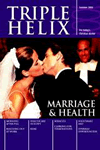Peter Singer is arguably the world's most famous contemporary philosopher. He is currently Professor of Bioethics at Princeton University, and well known for his support of abortion, euthanasia and infanticide. He has also been vocal about his opposition to 'speciesism' - the preference of human interests over those of other animals.
Rethinking Peter Singer is a long overdue examination of Singer from a specifically Christian angle. Gordon Preece and colleagues from Ridley College, an Anglican theological college in Melbourne, Australia, attempt to engage with Singer's writings and offer an evangelical critique of his work in a series of five essays.
Singer has been praised for his adherence to his ethics. However, in the first essay Preece notes that much of his philosophy is not only opposed to our moral intuitions, but is 'unthinkable' and ultimately 'unliveable' in daily life. The book sets much of Singer's work in the context of his life, and Preece cites the often highlighted inconsistency of his refusal to agree to euthanasia for his mother suffering from Alzheimer's disease.
Although Singer's views appear counterintuitive, Andrew Sloane points out that they are consistent with his theories. Preference utilitarianism, which underpins his philosophy, deems that any action is right if it furthers the interests of as many as possible of those affected by it. However, Sloane argues that this is intrinsically unsound, and fails to defeat alternatives, advocating an objective moral order with emphasis on actions, not consequences.
The two most helpful chapters are those tackling Singer's criticisms of Christianity and his views on personhood. As an outspoken atheist, his rejection of Christian scriptures is not surprising, but Graham Cole demonstrates how he caricatures the Christian position, making selective use of the Bible to support his cause.
I've heard Christians argue that it is impossible for us to engage with Peter Singer as his views are light years away from our own. However, others believe that Singer has made a major contribution to the Judaeo-Christian position by demonstrating the logical, 'unthinkable' alternative to our ethic. Indeed, Singer's aim is to do away with traditional theories, such as the sanctity of life principle, which represent 'relics' of the Christian view. With this in mind, we must understand his arguments and the theories supporting them. This is no bad place to start: as Gordon Preece himself puts it, '[this book] represents a religious determination to stay put and debate with the high priest of secular ethics'.
































